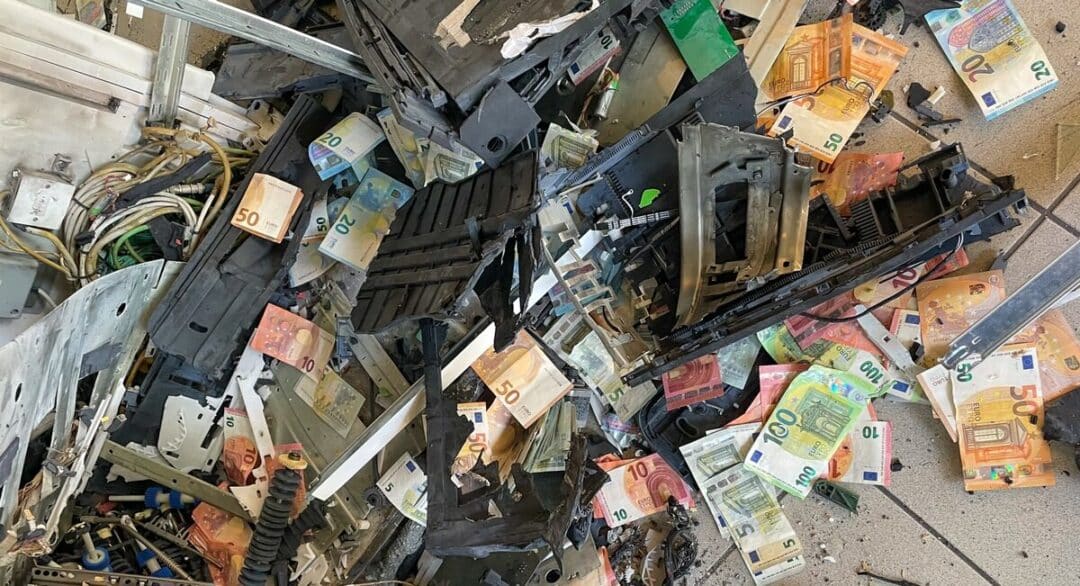

Wave of ATM Bombings in “Cash-Addicted” Germany Prompts Calls for Fewer ATMs and Less Use of Cash
by | Aug 13, 2024
“We see ATM blasts all over the world, but the intensity that we experience in Germany is really in a league of its own.”
In Europe, people don’t tend to rob banks anymore — the risks are simply too high and, in most cases, the rewards too low. Instead, they are blowing up ATMs. And Germany is their “prime target.”
That’s according to an article published Saturday by Bloomberg. The EU’s largest economy, it says, is suffering ATM bombings on an almost daily basis, as efforts to wean the country off cash have “not been well received.” In a subheading to a German-language version of the article, Bloomberg warns that “the German love of cash” is one of the main drivers. From the English-language version:
In the early morning hours of May 6, 2023, an explosion occurred in a bank in the German town of Bad Homburg, sending shattered glass as far as 30 meters away. Two men had broken into the building and filled the ATM with explosives. Once the device did its job, they grabbed €165,000 in cash, jumped into the waiting getaway car and rushed off into the night.
The theft took just a couple of minutes.
Almost every day — or usually, every night — an ATM is blown up somewhere in Germany. Europe’s biggest economy has become the prime target for sophisticated smash-and-grab operations by organized criminal groups. Very few people rob banks anymore, it’s not worth it. ATM bombings are quicker, less risky and the payouts are significantly higher.
“A League of Its Own”
Germany’s Federal Criminal Police Office has been collecting figures on ATM explosions since 2005. By 2015, the boom (pun intended) in ATM bombings was impossible to ignore. A year later, there were 318 bombings, and by 2022 the number had reached 496.
“We see ATM blasts all over the world, but the intensity that we experience in Germany is really in a league of its own,” said Stefan Lessmann, head of security at ATM-maker Diebold Nixdorf, the market leader for the machines in the EU.
The Bloomberg article offers three main reasons reasons for why this might be.
1. Germany shares a border with the Netherlands, which is home to the Amsterdam and Utrecht-based networks that are orchestrating most of the attacks against the ATMs:
The Netherlands had previously been the epicenter of these bombings, but by 2015, the Dutch had reduced the number of ATMs nationally from 20,000 to 5,000, fortified the remaining ones, and encouraged businesses and residents to wean themselves off cash.
With few targets left in their home county, the perpetrators went east: to Germany…
… where they apparently encountered “a paradise for ATM bombers.” Which brings us to the second reason.
2. Germany is a bastion of cash. The Bloomberg piece underscores Germany’s high number of ATMs (just over 50,000) as one of the possible reasons why the ATM arsonists are targeting the country. Yet this is only a shade higher than the total number of ATMs in the UK, a country with 15 million fewer people than Germany, most of whom use cash a lot less than their German counterparts.
In its 2023 payments report Deutsche Bundesbank found cash was used for 51% of payments, with debit cards in second place at 27 percent. This was down from 58% in 2021, though the Bundesbank’s Executive Board Member Burkhard Balz said the “decline is no longer as pronounced as during the coronavirus pandemic.”
As the central bank noted in a January report, “cash has a special significance in Germany.” This is a problem for EU authorities, particularly the European Commission, which are keen to wean European citizens off cash as they prepare to launch a digital euro.
A year ago, Foreign Policy magazine ran an article headlined, “Germany is Hopelessly Addicted to Cash,” which provides a laundry list of reasons why Germans, in particular, are unwilling to part with the old ways — their instinctive distrust of overweening state control following their experience of totalitarian governance; their “obsession with privacy, mistrust of big-tech and fintech in general, and worries about political and financial crises depleting bank balances overnight — an experience rooted in history as well as a cultural desire for control”) while gently admonishing the country for “standing athwart the global trend toward cashless payments.”
German citizens may also be mindful of the fragility risks posed by a fully cashless economy — after all, the country suffered a significant card payment outage just two years ago. As we reported last month, the sheer size and number of recent payment outages has even prompted British mainstream media establishments to warn of the “potential perils” of a fully cashless economy.
There are myriad other reasons why a fully cashless society is far from desirable, including the inevitability of more granular surveillance, the loss of one of our last vestiges of personal privacy and anonymity, the exclusionary effects it will have on those who are unable to access or use digital technologies, and the much greater power and control it would grant to both governments and corporations over our spending habits — and indeed potentially over our ability to spend money at all.
3. The third apparent reason why Germany is such an idyll for the ATM arsonist is the decentralised nature of its banking and criminal justice system:
[U]nlike the Netherlands, which has only four banks, Germany has a more diverse sector, including hundreds of independent savings and loan banks. Moreover, each of the country’s 16 states also has its own police force, making coordination a challenge.
Achim Schmitz leads the central police unit focusing on ATM bombings in North-Rhine Westphalia, the first German state to be targeted a decade ago. Schmitz and his colleagues have arrested hundreds of suspects and won stiff prison sentences over the years, but that hasn’t gotten the attacks to stop.
“In 2015, we initially thought there was a ring of perpetrators and once we caught the core people, we would get rid of the problem,” said Schmitz. “We had to give up on that hypothesis a long, long time ago.”
Instead, Schmitz and his unit have witnessed a seemingly never-ending supply of young men trained to work in highly specialized teams, most of whom are Dutch nationals of Moroccan descent.
As these attacks have intensified, German authorities have struggled to prevent them, the Bloomberg piece notes. The government is now proposing to raise prison terms for the bombings to a minimum of two and a maximum of 15 years as well as expand police surveillance powers around the attacks — nine years after they became a regular occurrence. There has also been “grumbling within law enforcement about whether banks are doing enough to prevent this sort of crime.”
Yet even when measures are taken, the criminals always appear to be one step ahead:
When ATM foyers were equipped with fogging systems — which quickly fill a room with dense smoke in the event of an attack — gangs started bringing in leaf blowers. When ATMs were fortified to make them more difficult to blow up, perpetrators doubled their efforts and switched from gas explosives to solid pyrotechnic materials. On balance, Germany’s Federal Criminal Police Office estimates that the success rate for these attacks is now about 60% percent.
However, reports from North Rhine-Westphalia, Germany’s most populous state, accounting for almost a quarter of the national population, suggest that authorities may have finally got a grip on the situation. According to the Interior Ministry, just 19 ATMs have been blown up in the state since January 1, 2024. The ATM bombers got away with “only” 732,000 euros in loot, public broadcaster WDR reports. In contrast, by August of 2023, they had already stolen 5.65 million euros from 97 machines.
The main reason behind the success is that banks have begun retrofitting their ATMs with coloured ink that dyes the cash in the event of an explosion. This is how banks in the Netherlands first protected themselves from the ATM bombing gangs. The number of attacks immediately plunged. But as the WDR article notes, the perpetrators simply expanded their prey area: first to North Rhine-Westphalia, then to the whole of Germany. Now, as the northern states clamp down, the criminals have taken their handiwork further south, to the German states of Bavaria and Baden-Wuerttemberg, and even into Austria and Switzerland.
But as the criminals head further south, the opportunities and loot appear to be dwindling. As the German-language version of the Bloomberg article notes in a subheading, the number of attacks is declining. However, in the English-language version, this important detail doesn’t become apparent to the reader until the 15th paragraph, where the authors finally admit that while official data for 2023 has not yet been published, preliminary counts suggest that numbers have been “continuously falling.”
In other words, the problem appears to be on the wane. Yet that doesn’t stop Bloomberg from closing its article with two quotes calling for fewer ATMs, and hence less cash in general — one from a bank lobby group and the other from a police officer who has worked on ATM bombing cases:
“Removing ATMs may be the last resort,” DGSV, a bank lobbying group, said of preventing such attacks. “This is certainly not popular, but there’s no alternative if there’s a risk to life and limb”…
Jens Burrichter has worked on ATM-bombing cases for the Lower Saxony police since 2015. For two years, he served at Europol, organizing conferences and coordinating cross-border communication to make sure police across Europe were working together to prevent attacks.
Like many of his peers, Burrichter is certain that Germany needs to learn from the Netherlands and drastically reduce its number of ATMs and overall use of cash. But he also knows that no one will win an election in Germany by campaigning on the end of ATMs.
“Hopelessly Addicted to Cash.” But for How Long?
German is an outlier in Europe. It is the continent’s largest economy and biggest industrial centre (though the government has been working tirelessly to try to destroy its industrial base), yet it is still, as Foreign Policy magazine puts it, “hopelessly addicted to cash,” with many Germans preferring to carry physical money and use it for everyday transactions, particularly small ones. In many other parts of Europe, particularly in the north, cash is, to all intents and purposes, dying a natural, albeit artificially accelerated, death.
In a survey conducted by the European Central Bank, 69% of Germans said that cash is either important or very important to them. As Der Spiegel International noted, with a gentle hint of PMC arrogance and derision, in its April 2 article, “Cash’s Last Stand”, this is particularly true of “older people and people with low incomes and education levels.”
But moves are afoot to reduce that use. As in so many countries, it is getting harder to access and use cash. The share of respondents to the Bundesbank payments survey who considered it “fairly difficult” or “very difficult” to get to an ATM or bank counter increased to 15% from 6% in 2021. This trend was apparent in both urban and rural areas.
Over the past decade the number of bank branches in Germany has almost halved, from around 40,000 to 20,000, according to the Bundesbank. In late 2023, Handelsblatt reported, almost gleefully, that German banks are closing their ATMs “at an ever faster pace” [Indeed, a cynic might argue that the ATM arsonists are doing the big banks a favour by providing a justification for accelerating their cull of bank branches and ATMs]:
[T]he number of ATMs reported for Germany fell by almost five percent in 2022. This is the largest decline since the data series began in 2000, as the analysis firm Barkow Consulting determined based on data from the European Central Bank…
The main reasons for the removal of ATMs are the decreasing use of cash and the high number of explosions…
Banks could even reduce the number of ATMs at an even faster pace in the future: the consulting firm Capco expects the number of machines to drop significantly in the coming years, says Capco payment expert Thomas Walkner. “More ATMs will probably be concentrated in cities. You now see more bank locations there that have three or four ATMs instead of just one as before.”
Walkner points out that supplying cash entails considerable costs for banks. “They have to invest more and more in security, and the costs of loading the machines with new banknotes have also become more expensive. Many banks used to do this themselves, but now they rely more on external service providers.”
At the same time, people are increasingly getting cash from supermarkets, either from on-site ATMs or through the supermarkets’ cash-back services. As Focus reported a few months ago, withdrawing money at the supermarket has become increasingly important, especially in rural areas, where many banks have closed their branches and removed ATMs. The amount of cash withdrawn in this way reached €12.3 billion in 2023, up from 2.23 billion, according to a study by the EHI retail research institute.
Nonetheless, “cash is coming under pressure from many different sides,” trumpets Der Spiegel, with government, banks and retailers leading the charge. Public transportation providers such as Hamburg’s HVV have abolished the use of cash on their bus lines. Hipster cafes and restaurants in the bigger cities are also going cashless. Speed, convenience and security are the watchwords. The owner of Barista Sistar café in Munich told Der Spiegel: “No one has ever been able to give me a rational explanation for why they only pay with cash.”
In a section of his blog, Geld (Money), titled “The Slippery Slope to a Cashless Society,” the German financial journalist and cash advocate Norbert Häring documents the growing number of cases of German businesses and state authorities refusing to accept cash payments. A few examples:
- The bakery chain Voigt has removed the option of paying with cash in its Theo’s bakeries in Bonn.
- The large bakery chain Göing in Hanover also wants to help with the abolition of cash and is making everything 5% more expensive for cash payers than for digital payers.
- The state-owned railway company Deutsche Bahn AG is also discriminating against cash users. The company has informed customers that from the end of the year there will no longer be any saver fares available from the ticket machines which accept cash. The discount fare will only be available online or with identification at the customer centre. As Häring notes, “the state-owned company is deliberately making anonymous travel more expensive. There is a system to this.”
Perhaps most importantly, cash could fall victim to generational trends. According to a survey by Postbank, one in three Germans say they could come to terms with the abolition of bills and coins — in the 18-to-39 age group, the figure is as high as 57%. In the Bundesbank survey, 44% of respondents said they would rather pay without using cash. By contrast, 28% cited cash as their preferred means of payment. A further 28% had no preference.
But if, as Der Speigel suggests, Germany (together with neighbouring Austria) is indeed the last stand for cash, it will not go down without a fight. The Alternative for Germany (AfD) party has called for a law to be passed stipulating that cash must be accepted in every store. A similar law is also under consideration in neighbouring Austria.
In countries where cash is still King, albeit a slightly diminished one, going cashless could have unpleasant consequences for businesses. In February, the supermarket chain Billa suspended its “cashless trial” in Vienna Leopoldstadt after only eight days following a customer backlash.
In early 2023, the electronics retailer Gravis, which was “Germany’s largest authorised Apple retail chain,” announced that it would be going fully cashless at all of its 40 stores. Fifteen months later, it declared bankruptcy. Did its decision to go cashless play a part in its demise? Probably not. The company was already in trouble in 2022, and has laid much of the blame for its bankruptcy on the post-COVID surge in e-Commerce as well as its outsized dependence on Apple products. That said, alienating part of its customer base by preventing them from using cash, a popular payment method, was probably not the best way to dig itself out of its hole.





0 Comments